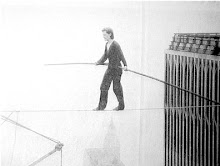I recently read The Puppet Masters by Robert A. Heinlein – in fact, it was the first thing by Heinlein that I've ever read in my life.
I have a complicated relationship with science fiction. I wouldn't count any science fiction writer among my top five favorite authors, but there are two of them in my top ten – Isaac Asimov and Kim Stanley Robinson. Some would argue whether Kim Stanley Robinson really is a sci-fi writer, but he's close enough that he isn't “not” one.
Even though I love Asimov's stuff, it's not so much because he was a great writer as because he was a great storyteller. He was a good enough writer, and smart enough to know what his readers would buy into and what they wouldn't. I'll take a good story over good writing any day, although the best fiction writers, obviously, do both well.
Kim Stanley Robinson's a pretty good storyteller too and, although he's not nearly as prolific as Asimov was (who is?), I think he's a much better writer.
My general beef with science fiction and fantasy is that so very often they present a scenario that I can't imagine could reasonably take place. I like Asimov because his stories, although generally set far in the future, are conceivable.
The Puppet Masters is conceivable too. It's hokey in some ways, having been written almost 60 years ago. His depictions of women are pretty outdated, even though he seems to have anticipated the sexual revolution on some level. By never anticipating the modern feminist movement as it eventually took shape, he seems to have gone straight to the so-called post-feminist woman in one of his protagonists. But the story itself reads like a detective thriller, and thrillers are always fun to read.
You won't find a whole lot of symbolism in this book, unless you equate the alien antagonists with Stalinism. Something slimy has come to Earth, apparently from Titan, and is taking over people's bodies and minds by attaching to their backs.
The main characters all work for a super-secret spy service that is charged with finding ways to save the world, so to speak, from its ameba-like invaders.
What I found interesting beyond the basic plot was the ideas about society that Heinlein presented way back in 1951 or so. As I mentioned, he had some ideas about the role of women in a future world that someone like Asimov wasn't ready to embrace at that time. His depictions of sexual relationships are a hybrid of 1950's idealized romance and late-70's uber-freedom. To call him a visionary would be giving him too much credit, but he certainly saw society moving in a specific direction and anticipated in some ways how that might play out.
After I started thinking about some of this I happened to look up Heinlein on Wikipedia and found that he was a bit of a folk hero to the 1960's counter-culture. Apparently Stranger in a Strange Land was particularly influential. I'll have to hunt down a copy and read it for myself.
Tuesday, March 22, 2011
Subscribe to:
Post Comments (Atom)

No comments:
Post a Comment